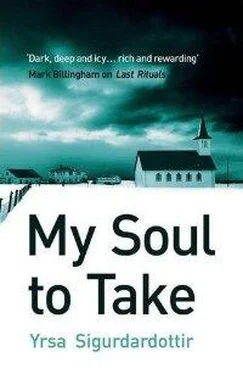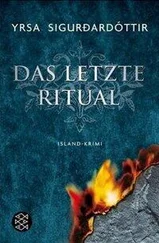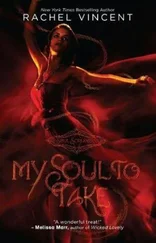Thóra did not care for the implication that she was a third-rate lawyer, but decided to hold her tongue. She knew that losing one’s temper was the best way to lose an argument. “Naturally, it’s up to you what you do,” she said calmly, “but I would like to remind you that judges get annoyed when people don’t try their utmost to resolve disputes before litigating. Courts are a last resort, not the first step.”
Elín placed her hand over her brother’s, which was gripping the carved arm of his chair. “I understand,” she said to Thóra. “But how else can we resolve this? What do you propose?” She turned to her brother, smiling encouragingly. “We’re open to suggestions.”
“Call in an exorcist, maybe?” grunted Börkur. “How about that?”
Ignoring him, Thóra focused on Elín. “Shouldn’t we start by discussing whether you two have ever been aware of any supernatural activity there?”
“Yes, why not,” Elín replied, her grip on her brother’s fingers tightening. “That’s easy. I’ve never been aware of anything strange going on, because I’ve hardly spent any time there. Our mother was brought up at Kreppa with our grandfather Grímur. His brother, Bjarni, owned the land at Kirkjustétt where the hotel was built, but he died young. If there were any stories about that farm, we wouldn’t necessarily have heard them.”
“How about you?” Thóra asked Börkur. “Have you ever noticed anything, or heard any accounts of either farm being haunted?”
He shook his head impatiently. “Of course not. There’s nothing to notice or hear. I don’t go in for that bullshit. And I’ve spent even less time there than Elín.”
Thóra turned her attention back to the sister. “So how come the farms are in such good condition? I didn’t see Kirkjustétt before the hotel was built, but we took a look at Kreppa and I assume that Kirkjustétt was in a similar state.”
“Yes, it would have been,” Elín answered, her voice level. “We looked after the farmhouses well.” She gestured around to the room they were sitting in. “This house has been in the family ever since my great-grandfather built it. We’ve always used it as a retreat when we come to this part of the country. It’s much more home, and not as remote as those two old farms. My brother and I don’t come here often, but we could easily have shared it.”
“But why maintain the farmhouses? What was the point?” asked Thóra.
“Well,” Elín said. “It meant a lot to Mother when she was still in good health. She didn’t want to disturb anything because she planned to move back to the countryside in her old age and wanted to keep everything the way it was. That never happened, though, because care provision for the elderly is very basic here, compared with Reykjavík.” She lifted her chin. “Nonetheless, we kept the houses after Mother fell ill, because we had the idea that Börkur’s children and mine could eventually inherit one farmhouse each. Although the two of us don’t mind sharing this house, we knew that someday our children might want to come here with their own families.”
“So why did you sell them?” Thóra asked. “You kept the farms in good shape for decades because of your children, then sold them once they’d grown up.” By way of explanation she added, “I’ve met your daughter, Elín—Berta—and I expect your other children are of a similar age.”
Elín smiled coolly. “That’s just the way it turned out. I only have the one daughter, actually, but Börkur has two sons. Neither of them has shown any interest in Snæfellsnes, so there’s no need to hold on to the farms.”
“What about Berta?” Thóra asked. “I met her here and it sounded like she comes out here quite a lot.”
Elín gave the same cold smile. “Berta spends a lot of time here, that’s true. But Börkur and I have agreed that I’m going to buy his share of this place, so it’s unnecessary for my daughter and me to own two houses in western Iceland. It’s enough of an investment for the family to own all those farm properties. In fact, we’re getting rid of them one by one.”
“Do you own other farms around here?” Thóra asked.
“Yes,” Börkur chipped in, his chest swelling with pride. “Quite a few.”
Thóra wrinkled her brow. “So why didn’t you just sell Jónas one of those?” she asked, puzzled. She thought that for most people the last thing they sold would be the property with sentimental value.
“Jónas was looking for farmland with an old house on it,” Börkur replied morosely. “He really wanted to buy the site once he heard there was not just one farmhouse on it but two.”
“He made us a very good offer, as you know,” Elín added. “It was simply time to make a decision.”
Thóra wondered whether to probe further into their reasons for selling the farms. She wasn’t convinced, particularly given Elín’s chilly demeanor. Not wanting to provoke the woman with more questions, she changed the subject. “Did you know anything about the history of the farms?”
“Did we know anything about it?” repeated Elín. “Of course we did, but unfortunately I’m not much good with things like history and genealogy.” She released Börkur’s hand. “The same goes for my brother, I’m afraid.”
Börkur sat up a little and cleared his throat. “I’ve always meant to look into it in more detail, but I can never find the time.”
“But you must have heard stories from your mother over the years?” persisted Thóra. “Don’t you remember any about the farms?”
“Our mother didn’t really discuss her life here,” Elín replied. “She was so young when she moved to Reykjavík with Grandfather.” Elín looked down at her lap. “It’s no secret that her life wasn’t a bed of roses. Kristrún, our grandmother, died when Mum was still a baby, and we understand that Grandfather was far from being a model father. He had a few issues, shall we say, and never recovered properly after Grandmother died.” Elín looked up again, into Thóra’s eyes. “Unfortunately I don’t remember him, so I can’t judge for myself, but I’m sure he wasn’t a bad man.”
Thóra frowned. “Why do you phrase it like that? Did he mistreat your mother?” Could this be the incest story Sóldís had mentioned?
“In a way, yes,” replied Elín. “He committed suicide. Mother was only eighteen, and I know I would never let my own child find me dead, so to my mind he wasn’t a good father, whatever else can be said for him.”
“Oh, come on,” objected Börkur suddenly. “You know he was ill. You can’t expect someone who’s clinically depressed to behave in a way society would deem normal—that’s discrimination.”
Elín glared angrily at him for a moment without answering. Then she relented slightly. “Of course, my brother has a point. I love Mother so much that I can’t help feeling bitter about how he failed her.” She looked around the room. “I’m pretty sure the reason Mother kept the farm going was that everything was wonderful when she lived here. It wasn’t until they moved to the city that Grandfather’s illness developed. She wanted to hold on to her memories of a happy childhood.”
“I understand. It must have been difficult,” said Thóra sympathetically. “I noticed your grandmother’s gravestone in the cemetery by the farm, but your grandfather Grímur doesn’t seem to be buried with her. If you don’t mind me asking, why is that?”
Elín pursed her lips. “Mother said she’d decided that after he died. He left no instructions as to his preferred place of rest, and she didn’t want to have him buried here on Snæfellsnes. I think perhaps she wanted to have him close to her, because she was living in Reykjavík.”
Читать дальше












